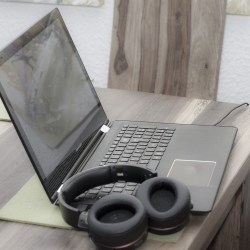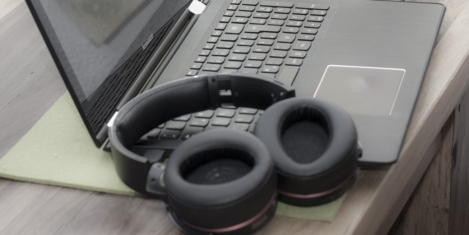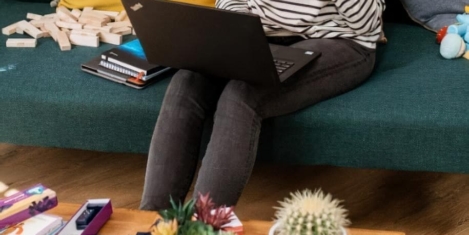March 1, 2021
Zoom fatigue is real and has four basic causes
 The much discussed idea of Zoom fatigue turns out to be a real phenomenon according to new peer reviewed research from Stanford academics. The study published in the American Psychological Association’s journal Technology, Mind, and Behaviour found that meetings conducted via video calls leave participants feeling more exhausted and emotionally drained than those held face to face. The study found the four most important factors that make video calls so exhausting; the constant need for eye contact, the ability to see one’s own face constantly during meetings, the need to sit still for long periods and difficulties in interpreting or communicating via body language. (more…)
The much discussed idea of Zoom fatigue turns out to be a real phenomenon according to new peer reviewed research from Stanford academics. The study published in the American Psychological Association’s journal Technology, Mind, and Behaviour found that meetings conducted via video calls leave participants feeling more exhausted and emotionally drained than those held face to face. The study found the four most important factors that make video calls so exhausting; the constant need for eye contact, the ability to see one’s own face constantly during meetings, the need to sit still for long periods and difficulties in interpreting or communicating via body language. (more…)









 The UK COVID-19 vaccination programme is well underway. Once the over 50s, younger people with health conditions, NHS and care workers have received the vaccine, Prime Minister Boris Johnson has been clear that current lockdown restrictions could be lifted in stages with schools and business a top priority. The situation is under review, but there is an expectation that business premises could reopen as early as Easter, when a large proportion of the working age population may not have been vaccinated. That means the focus in workplaces and other multi-occupant spaces, especially those open to the public, must remain on limiting transmission to prevent the spread of
The UK COVID-19 vaccination programme is well underway. Once the over 50s, younger people with health conditions, NHS and care workers have received the vaccine, Prime Minister Boris Johnson has been clear that current lockdown restrictions could be lifted in stages with schools and business a top priority. The situation is under review, but there is an expectation that business premises could reopen as early as Easter, when a large proportion of the working age population may not have been vaccinated. That means the focus in workplaces and other multi-occupant spaces, especially those open to the public, must remain on limiting transmission to prevent the spread of 
 Almost two million workers were unemployed or fully furloughed in January – and had been for at least six months – highlighting the scale of lasting damage to the UK’s labour force that will need to be addressed in the Budget, according to major new research published today by the Resolution Foundation.
Almost two million workers were unemployed or fully furloughed in January – and had been for at least six months – highlighting the scale of lasting damage to the UK’s labour force that will need to be addressed in the Budget, according to major new research published today by the Resolution Foundation. 
 As Brits continue to spend an extensive amount of time at home, the importance of maintaining a good work-life balance has never been so vital. For their
As Brits continue to spend an extensive amount of time at home, the importance of maintaining a good work-life balance has never been so vital. For their 
 How good your line manager is makes the difference between an employee coping or struggling in lockdown. But too often line managers’ heroic efforts are not noticed by their employers, claims new report, titled
How good your line manager is makes the difference between an employee coping or struggling in lockdown. But too often line managers’ heroic efforts are not noticed by their employers, claims new report, titled 
 There’s no question that many people now, feeling the weight of lockdown 3 and with no clear view on the timing of any sort of ‘return to normal’, are finding it tough to stay motivated. Many are burnt out. We can gain some insight into what is going on for many individuals by way of neuroscience, specifically how the brain works and how it copes with changing situations.
There’s no question that many people now, feeling the weight of lockdown 3 and with no clear view on the timing of any sort of ‘return to normal’, are finding it tough to stay motivated. Many are burnt out. We can gain some insight into what is going on for many individuals by way of neuroscience, specifically how the brain works and how it copes with changing situations. 
 The uncertainty and fallout of the COVID-19 pandemic have wreaked havoc on the mental health of nearly all of us. In a recent conversation with an HR leader, she shared with me that every single person on her leadership programme reported suffering disrupted sleep due to their anxiety around business uncertainty. The irony is the business is in better shape than it has been for years thanks to the effective management of the firm’s finances during the pandemic. Regardless of reality, the uncertainty is impacting on everyone’s resilience levels.
The uncertainty and fallout of the COVID-19 pandemic have wreaked havoc on the mental health of nearly all of us. In a recent conversation with an HR leader, she shared with me that every single person on her leadership programme reported suffering disrupted sleep due to their anxiety around business uncertainty. The irony is the business is in better shape than it has been for years thanks to the effective management of the firm’s finances during the pandemic. Regardless of reality, the uncertainty is impacting on everyone’s resilience levels. 
 While workers in the UK have been working from home, if they can, for almost a year, a third say they miss commuting, claims research from recruiter
While workers in the UK have been working from home, if they can, for almost a year, a third say they miss commuting, claims research from recruiter 
 A new generation of long-term homeworkers created by COVID-19 is at risk physically and mentally through inadequate employer support, claims research by
A new generation of long-term homeworkers created by COVID-19 is at risk physically and mentally through inadequate employer support, claims research by 
 New research from
New research from 










February 3, 2021
COVID-19 is having an unequal impact on the mental health of workers
by Brendan Street • Comment, Wellbeing